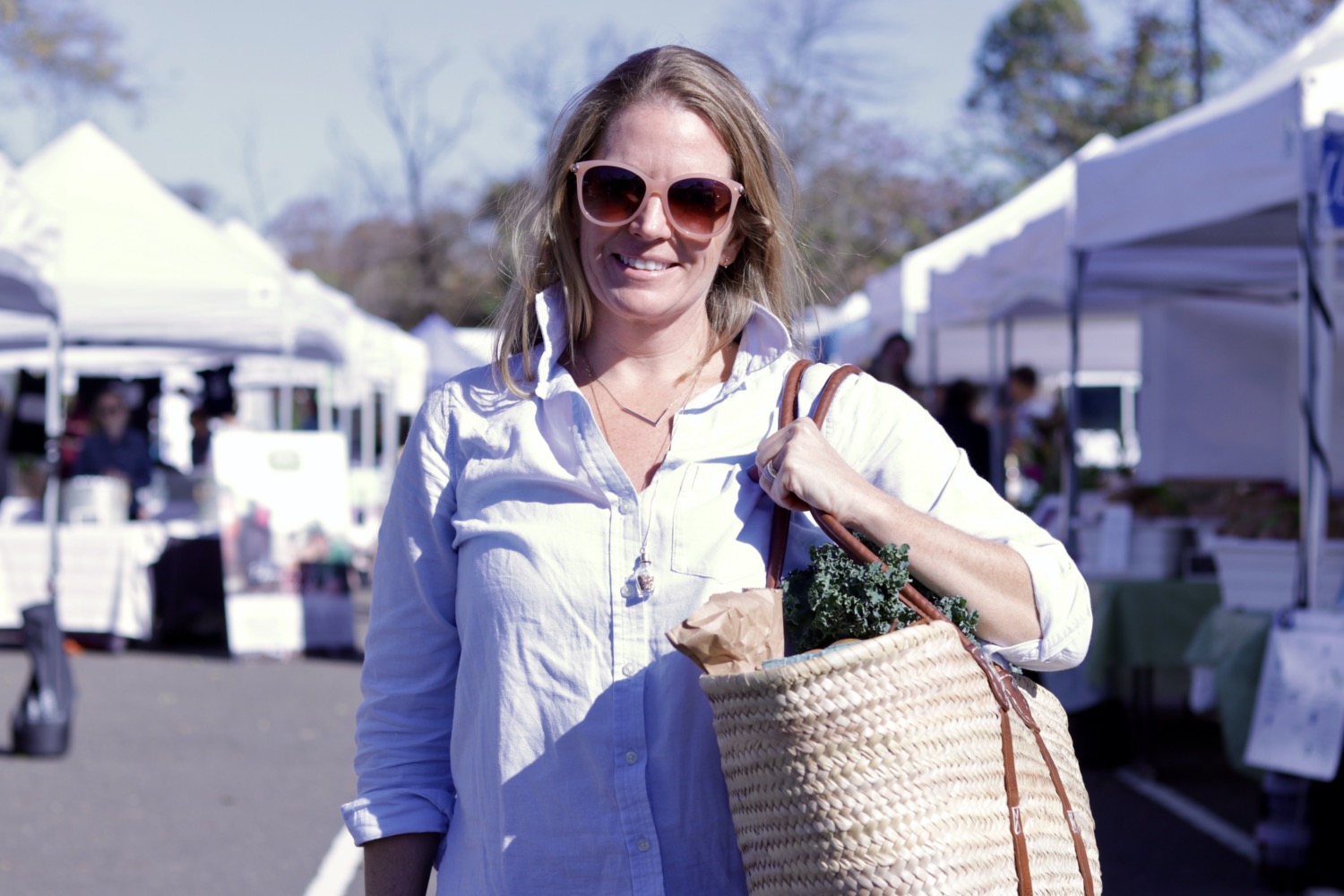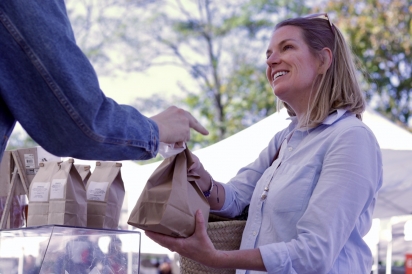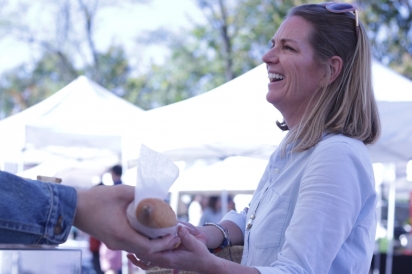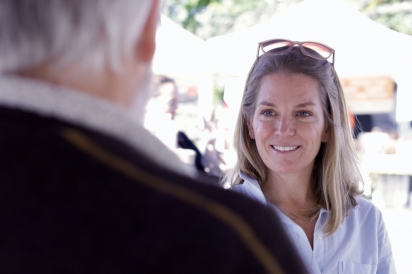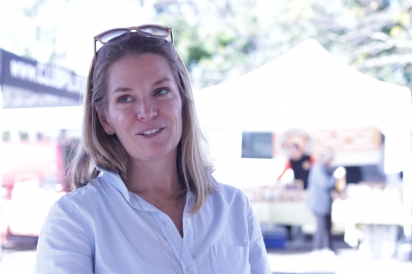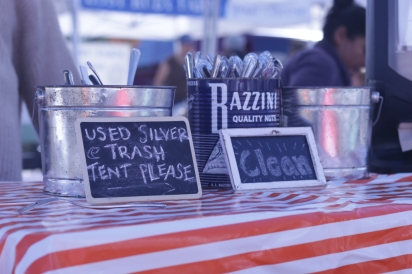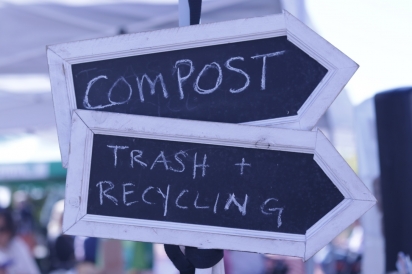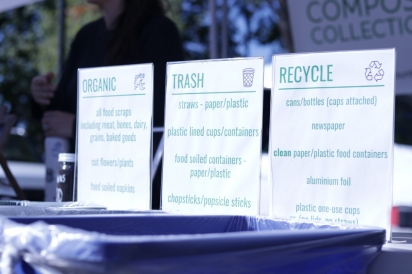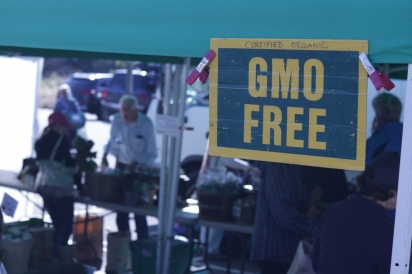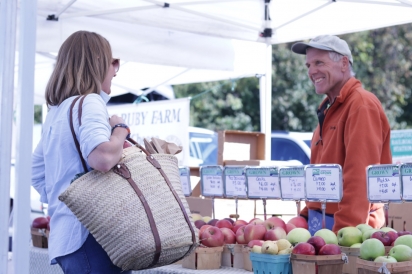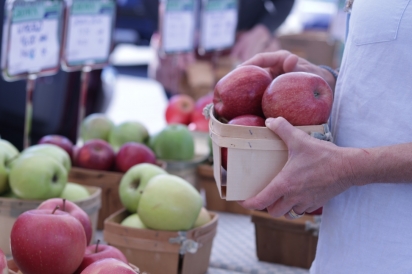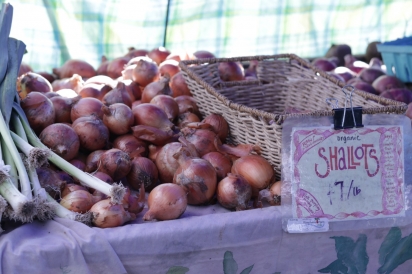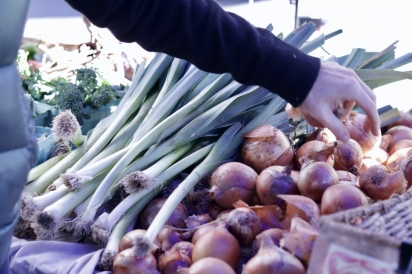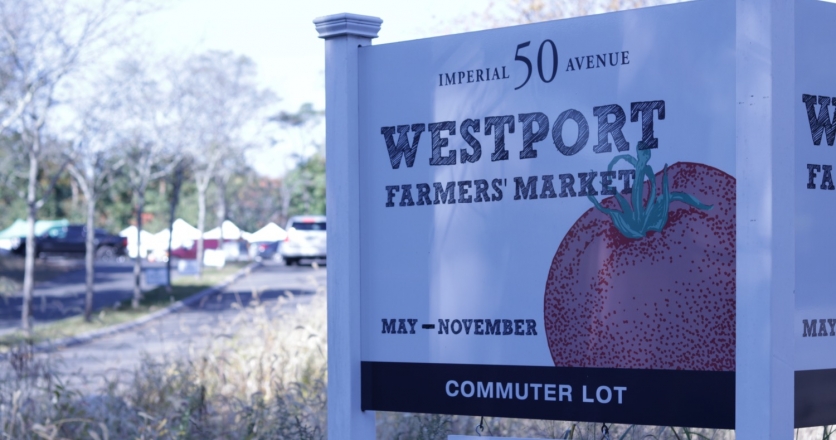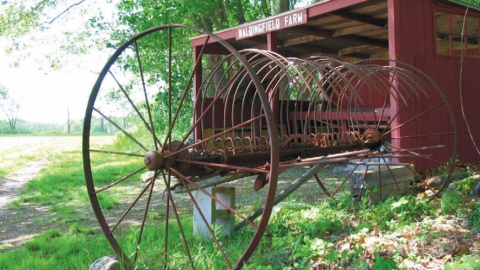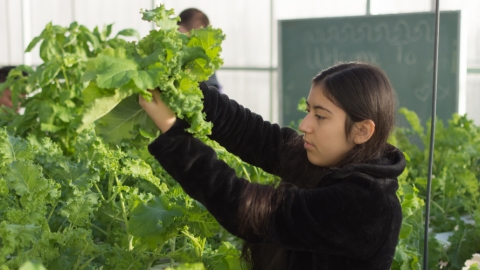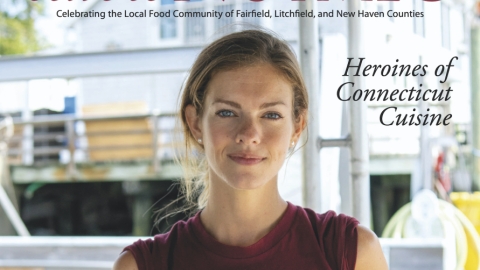Lori Cochran-Dougall
Lori Cochran-Dougall is the brains, as well as the brawn, behind the Westport Farmers’ Market.
Having spent her formative years in Roanoke, VA, Cochran-Dougall arrived in Westport after a 17-year interlude in Jackson Hole, Wyoming, where she chaired the Wyoming Farmers’ Market board of directors. She had started her life over from scratch for the second time when she arrived, unmoored and uncertain, in Connecticut. The market helped bind her to the land and community. After being promoted to Executive Director of the market in 2012, Cochran-Dougall turned it into one of the state’s most-successful farmers’ markets and one of what was, at the time, a select number of 501(c)(3) status, non-profit markets in the country. She has also used her platform to connect with other local non-profits, like Bridgeport Rescue Mission.
Cochran-Dougall met up with us at the recently remodeled Westport Public Library. There, we chatted about Cochran-Dougall’s beginnings, her staunch support of eating and shopping locally, and her thoughts on the future of sustainability in Connecticut.
GROWING UP AROUND FOOD
What was your relationship with local food, growing up?
It’s interesting you asked, because that’s probably the biggest foundational influence on me. My mom and dad came from places where they grew and raised their own food. Every Saturday, they would put us in the car, and we would go to the farmers’ market. She knew all the farmers. My mom was a big corporate person, as well – she went to work every day. But we had a hot breakfast every morning – a lot of southern food: grits, eggs, bacon, that sort of thing, homemade biscuits almost every day. But the farmers’ market was really integral to our kitchen.
COMING TO CONNECTICUT
How did you find yourself in Connecticut?
The man whom I married was actually picked out of civilian life to go serve in Iraq. And while he was there, our three kids from his previous marriage moved to Connecticut with their mom. So when he got home from war, we just – once again in my life – quit everything and moved. We just picked everything up. We didn’t know anyone here. We were just like, “We’ve gotta go. The kids are there.”
My one stipulation was that I wanted land, because in Jackson Hole, you don’t have land. It’s all protected, so only 3% can be developed. We are grateful to live on five acres. We have two huge wildflower fields in the front that we mow paths through. We have bees, and I’ve got blueberries and apples and maple – we do maple syrup. We have 20 chickens.
GETTING HER FOOT IN THE DOOR
How did you get started with the Westport Farmers’ Market?
I come from a corporate marketing background. When I moved here, I was trying to commute to Stamford. I was getting on the train, and I was losing my cookies. In my newly-arrived-from-Jackson-Hole mindset, everybody wore all black, nobody spoke to me, no one skied during lunch. My husband, in his wisdom, said “Why don’t you go volunteer at a farmers’ market?” So I Googled farmers’ markets near me, and Westport came up.
I went over to the woman running the market and said, “I would love to volunteer for you.” This woman, who now is a friend of mine, is the incredibly talented Sherri Brooks Vinton. At the end of the market, I asked, “Would you mind if I came back next week?” And she said, “How about this – I’ll pay you $10 an hour.” And to this day – I even feel it right here in my face, I feel it in my heart – it almost brings tears to my eyes.
Why do you think that moment was so touching for you?
I don’t know if, at that moment, I recognized that it was emotionally touching, but it definitely was, looking back. I left all my friends. I left all my family. I left the place that I love and moved somewhere I didn’t know a single soul. A farmers’ market, once again, was a place to connect. It was a place to actually meet people. And it was a place I felt comfortable, and I could do something.
But the market was struggling. I did not know, truth be told, the level to which it was struggling until later in the season. Then, I got to know the people who started the market, including Rebecca Howe, who was the market’s fairy godmother, as well as Selectmen Shelly Kassen and Gordon Joseloff – amazing people. Rebecca and Shelly knew I had chaired the board for the market in Jackson Hole, and they came to me and asked, “Would you want to run this?”
That next spring, we put a good bit of the market’s expenses on our personal credit cards. We started the Friend of the Market program and decided to become our own 501(c)(3). I was told that we’re one of the first 150 farmers’ markets in the country to receive this designation.
I feel very supported by the board I have currently, as well as the board that has served in the past. Their support has allowed this market to grow and flourish.
SUSTAINABILITY IN CONNECTICUT
How far has Connecticut come, sustainability-wise? How far do we need to go?
I think the local food movement has taken hold, though I remain concerned that it could become “old news.” If every restaurant bought 1% of local product, there would be almost no food waste in our state. Food waste is a big component of our environmental issues.
What do you think are the biggest obstacles to our sustainability goals, as a state?
Did you know that, currently, we are burning waste, that we burn plastic, we burn refuse, and the released carbon goes directly into the atmosphere? We have been a Democrat-run state for over a decade, and I would hope that the party would focus on the environment and economic growth. Everybody says things like, “We’ve gotta vote left!” or “We’ve gotta vote right!” I don’t care what side you vote for. Don’t vote for a side. Let’s vote for people who actually want to do something to change the environment. Let’s vote for the person and what they will do, rather than the party they align themselves with.
How is the Westport Farmers’ Market able to help drive sustainability in the community?
My purpose is to affect change, and I know that. I know it, whether I’m affecting change at this farmers’ market or helping a farmer sustain themselves…or whatever my role is at that given moment, like starting an initiative to get rid of plastic straws here. People ask, “Why is that a big deal?” Do I give that much of a crap about plastic straws? Yes, because it’s only to get us to get rid of single-use plastics. The only reason for me to focus on it is because it was small enough to get people to start thinking. The moment they see that straw, they think of the cup. Then they think of the lid, and so on.
We are 95% single-use-plastic-free at the farmers’ market. There is a farmer who has hummus that’s in a plastic container. There’s this feta pesto that everyone loves that’s in plastic. I was like, “Okay. I’ll give you three months. You get three months of this thing, and then it’s gone.” I’ve had farmers come and say, “We can’t change our plastic bags.” They changed their plastic bags; they have no problems. [It’s all just] mind shifts.
ON CAREER
Have there been any areas that were harder to penetrate, as a woman?
Within the sustainability industry, no. I think that being a woman has an advantage to it. We talk a lot about the disadvantages of being a woman right now, but I think there’s such an advantage, because we have the ability to play in both spaces. You’re able to be beautiful and elegant in one space, and you’re able to go out and dig in the dirt in another. More and more women are becoming farmers. In fact, there’s a huge upswing of female farmers across the country, and I think we’re going to continue to see that trend grow.
What projects are you working on outside the market?
I like to stay busy, so I have a few things up my sleeves. Recently, I introduced legislation to designate Easton as the Christmas Tree Capital of Connecticut. That designation helps farmers in Easton – and throughout Fairfield County – apply for agricultural grants.
Chef Bill Taibe and I are also working on a podcast, which we donate to the [Westport Public Library]. And we’re really honored to be doing it. I love this space.
One thing I am focused on is using film and conversation and different platforms to bring more education around local food systems to the area. So maybe I’m just trying to get more of a message out.
You were recently named First Citizen of the Year by the Westport/Weston Chamber of Commerce. What do you feel this means for your career?
Well, I think it’s humbling to get acknowledged. I think that’s amazing. What does it mean for my career? I have no idea if it means anything for my career, outside of that I don’t take anything very lightly. I don’t want to let this community down. I don’t want to let the environment down. I don’t want to let my kids down. If anything, the award motivates me even more.


